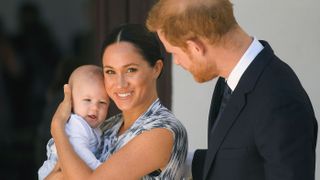Who inherits the British throne?

When the Duchess of Sussex, better known as Meghan Markle, gave birth to a baby boy on May 6, 2019, royal baby watchers all over the world rejoiced. "I haven't been at many births. This is definitely my first birth. It was amazing, absolutely incredible, and, as I said, I'm so incredibly proud of my wife," father Prince Harry said afterward.
But the new baby, named Archie Mountbatten-Windsor, did not just bring joy to the besotted new parents; he joined the crowded field of royals who have a (slim) chance of one day succeeding to the British throne.
In the much-anticipated interview of Meghan Markle and Prince Harry by Oprah Winfrey on March 7, 2021, the couple announced they are expecting a second child, a baby girl, "some time in the summer." However, during the interview, Markle also explained that her son Archie had been denied a royal title. In addition, Markle said that Archie had not benefited from the security detail ordinarily provided alongside the position of a prince.
The rules on inheriting the title of either Prince or Princess go back to the 1917 Letters Patent, released by King George V. They read: "The eldest living son of the eldest son of the Prince of Wales shall have and at all times hold and enjoy the style title or attribute of Royal Highness with their titular dignity of Prince or Princess." As Prince Harry is the younger of Charles' two sons, his own children therefore do not automatically qualify for such titles.
Despite this, Archie remains the first British-American royal in line for the crown. But just where does he fall in the line of succession?
For centuries, the royal line of succession to the British throne was — like in most monarchies — based on primogeniture, which traditionally gives preference to the firstborn male heir of a king and queen, meaning he inherits the title, lands and all other property belonging to his family.
One benefit of primogeniture is that it keeps all the lands belonging to a family intact and profitable: In many agricultural societies, divvying up land into smaller parcels that are too small to support an extended family would quickly reduce a family to penury.
Related: The 10 most powerful modern women leaders
In the British royal family today, the throne will pass from Queen Elizabeth II upon her death to her son Prince Charles. Next in line is Charles' eldest son, William, the current Duke of Cambridge, who is married to Catherine, Duchess of Cambridge, also known as Kate Middleton.
Because of a dramatic break with tradition, William and Kate's eldest child, who was born in 2013, will be next in line to inherit the throne, regardless of the child's sex. Kate did end up having a boy, Prince George. That change was adopted in 2011, when the leaders of 16 British Commonwealth countries (including Australia, Canada, Jamaica, New Zealand and other countries) met in Perth, Australia, and voted unanimously to alter the centuries-old rule of succession. Previously, daughters could only inherit the British throne if there were no living sons.
Prince George's siblings, Princess Charlotte and Prince Louis, are next in line to the throne. Prince Harry is sixth in line, followed by baby Archie, who is seventh in line to the throne. As well as the first British-American royal baby, Archie is automatically a British citizen, but will have to apply at the U.S. consulate for American citizenship. The little one is also the first biracial baby to be in line for the throne. As a result of the new rules of 2011, Archie's sister, when she is born, will be eighth in line to the throne, but will likewise probably not be given a royal title at first. After the birth of the Sussex's second child, the Queen's son the Duke of York, Andrew, will be bumped to ninth in the line of succession.
Another long-held rule that was tossed out in 2011 stipulated that no heir could assume the throne if he or she were married to a Roman Catholic. That rule was based upon centuries of religious persecution and warfare going back to the reign of Henry VIII, who broke with the Roman Catholic Church to divorce his wife, Queen Catherine, and marry Anne Boleyn.
But because one of the duties of the British monarch is to head the Church of England, even today, no Roman Catholic can hold the crown.
In a 1994 interview, Prince Charles caused a royal kerfuffle when he stated that he would rather be seen as a "defender of faiths," including Catholicism and other religions, according to CNN.
Another form of inheritance is known as ultimogeniture, in which the last-born child (again, usually a male) inherits the lands and titles of his parents. Ultimogeniture is sometimes used to compensate the youngest son for remaining in the home longer and caring for his elderly parents. It was practiced in a handful of medieval European realms and in certain Japanese dynasties.
Strict primogeniture and ultimogeniture are relatively rare; in most cases, all male and female heirs are provided with some share or lands, titles or other rewards, even if they don't inherit a royal crown.
Editor's Note: This article was first published in 2013 and updated by Timothy Williamson on March 9, 2021.
Originally published on Live Science.
Sign up for the Live Science daily newsletter now
Get the world’s most fascinating discoveries delivered straight to your inbox.

